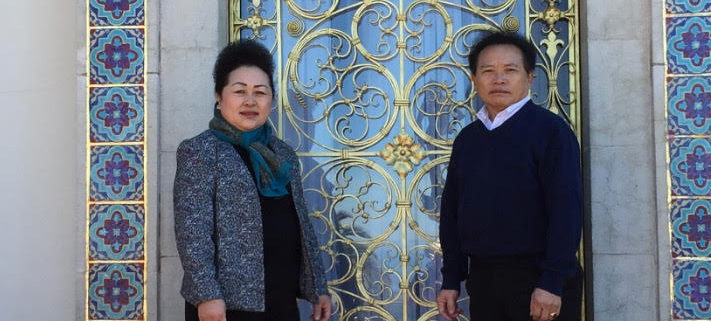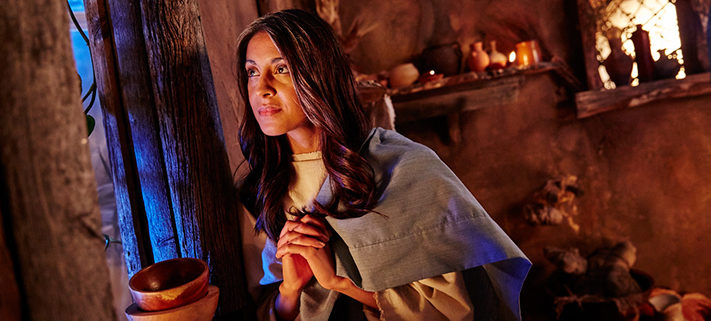Salt of the earth: Part 3
As Jesus renews us through his grace and mercy, we can be zealous in sharing that hope with others.
Jeffrey D. Enderle
My phone buzzed. Checking it revealed a text message from a dear sister in Christ, Lavinia. She texted a prayer request on behalf of her family. Lavinia’s sister had died, and Lavinia was on her way to the memorial service. I sent a quick message expressing my condolences and assured her I would keep her family in my prayers. I would pass along the prayer request to the rest of the congregation as well.
Then it hit me. Her text message sounded really familiar. Hadn’t she just sent me a similar message not too long ago? I pulled out my phone again and started scrolling through the messages. There was another message a few weeks ago just like this one. Was this the same person? I fired off another quick text asking for clarification.
Unfortunately, it wasn’t the same family member. This was another painful death close to home. As we went back and forth, it came out these weren’t the only ones. Additional family tragedies had struck. In all, there had been six deaths in her family over the past few weeks. A sister. A sister’s husband. One had gone suddenly, unexpectedly. Another had been suffering, in declining health for such a long time. Still another had been the result of mounting health issues. And one had been run over by a car. Intentionally.
This was a lot for Lavinia. I had been praying and sharing prayer requests on behalf of her family. Now I turned by attention to Lavinia herself and prayed that God would allow her to endure all this personal tragedy.
Worn down and exposed
You’ve probably experienced enough tragedy of your own to understand some of the side effects. Your tragedies don’t have to be as many or as dramatic as Lavinia’s. You wrestle with the emotional fallout. You find it hard to concentrate. You are distracted from your normal routine. You can’t keep all the doubts and questions from bouncing around in your head. Sometimes it even robs you of sleep, zapping your energy. The whole experience becomes such a burden. Joy gets suffocated out of your life.
In our part of the country, climate conditions can be brutal. The high desert sun can beat down oppressively from above. Winds commonly whip up a frenzy of sand and dust. Without shelter, you can start to feel dried out, cracked, and brittle. You wonder if you’re about to get swept away or crumble in the extreme environment.
I couldn’t help wondering if that was happening to Lavinia—and not because of the weather. I was wondering if all the tragedy was starting to pile up on her and about to crush her. It can all be so brutal.
She is such a quiet, gentle soul. But she’s a tough lady too. That’s because she’s always such a rock to the people around her. She’s there for her husband and daughters. She’s always helping with her grandchildren. Her siblings rely on her for support. Nieces and nephews and cousins rely on her strength. She is always ready to reach out with a kind word, a caring gesture, or her calming presence.
But that kind of care and concern for others can wear you out. It grinds down your enthusiasm when the needs keep piling up. When you keep giving and giving and giving, it uses up your capacity for compassion, leaving your tank empty.
Zeal feels impossible. Enthusiasm appears unattainable. Any kind of energy for other people has already evaporated.
In those cases, the danger is similar to the risks accompanying extreme weather. Exposure is the issue. Exposure to deaths, tragedies, and defeats are issues for our souls. Trying to weather them alone is dangerous. Souls are at risk.
Sheltered by God’s grace
So that became my prayer focus for Lavinia. While I continued to bring her family to the Lord in prayer, I shifted to include prayers for Lavinia’s exposure to spiritual extremes as well. If she was exposed to all those tragedies, they could inflict real damage to her soul. Cracks could be created in her confidence in the Lord. Weaknesses in her trust could be exposed. She could end up crumbling under the weight of everything going on all around her.
After the funeral, I decided to give Lavinia a call, just to check how she was holding up. She admitted things were taking their toll on her. But she was thankful she was able to be there to support her family in their time of need.
She was feeling a little worn out. That’s also when we realized the Lord was using her at this difficult time. Her hope in Jesus was so rare amid all the gloom and despair. She didn’t have to do anything amazing. She didn’t have to change the circumstances for her family. She simply had a chance to share her hope in Christ.
Lavinia took her refuge under the shelter of God’s grace. Her Savior had done more than just be present for her in her struggles. Jesus had completely dedicated himself to her spiritual rescue. He never let up for a moment. He never took a break from serving sinners. His life was one huge commitment to living the perfection God demands of every human being. In his most helpless and most agonizing moment, he still was able to cry out: “Father, forgive them” (Luke 23:34). He knew exactly what sinners needed. Jesus never came up short in giving peace and strength to his people.
Refreshment came from the Lord. Like a cool mist after a punishing desert wind, the Spirit comes to God’s children. The Holy Spirit makes Christ’s victory your victory. Jesus defeated death and hell, which rob lives of joy and hope. The same power that brings faith to hearts brings confidence to Christian lives. Gospel promises well up in hearts of faith. Blessings bubble up from God’s words of peace.
In times of trial and tragedy God’s people get to be that cool, refreshing breeze for others. We get to be instruments of God’s restoration. We have the chance to share real hope with people going through genuine hardships. Our words and example are real, forged in the fire of our own trials. The good news of what Jesus has done for us is the basis of everything we do for the people in our lives. His power works through us to bring his unconditional love and forgiveness to the people in our lives who are also struggling, perhaps even more than we are. God’s mercies restore and refresh us so we might share his love with others.
Jeffrey Enderle is pastor at Christ the Rock, Farmington, New Mexico.
This is the third article in a 12 part series about Christian love in action and how we can be salt in this world.
SUBMIT YOUR STORY
Do you have a manuscript, idea, or story from your own life you’d like to share for use in Forward in Christ or on wels.net? Use our online form to share it to our editorial office for consideration.
SUBSCRIBE TO FORWARD IN CHRIST
Get inspirational stories, spiritual help, and synod news from Forward in Christ every month. Print and digital subscriptions are available from Northwestern Publishing House.
Author: Jeffrey D. Enderle
Volume 104, Number 8
Issue: August 2017
Copyrighted by WELS Forward in Christ © 2021
Forward in Christ grants permission for any original article (not a reprint) to be printed for use in a WELS church, school, or organization, provided that it is distributed free and indicate Forward in Christ as the source. Images may not be reproduced except in the context of its article. Contact us




